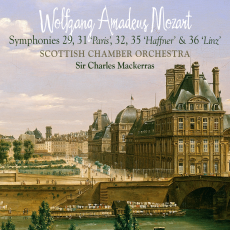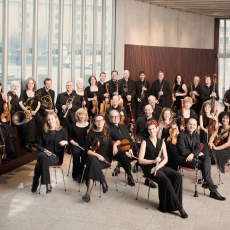Mozart Symphonies 2 - SCO & Sir Charles Mackerras - International Record Review
In 2007 Charles Mackerras and the Scottish Chamber Orchestra recorded the last four Mozart symphonies for Linn, in performances that I describes in ITT in March 2008 as ‘a vibrant and utterly gripping experience from first moment to last, and all caught in sound that is amazingly lifelike'. In July last year, with the same recording team in the same hall, the SCO and Mackerras recorded another five Mozart symphonies, now issued as Volume 2. At the risk of repeating what I wrote two years ago, I find this new set similarly inspired and it continues the marvellous achievement of the first volume. It does so with works that are not all as well known.
The remarkable little Symphony No. 32 has parts for four horns and this short but memorable piece comes across with tremendous relish here, the horns especially telling. Mozart's A major (No. 29, K201) is described in Timothy Jones's very informative notes as ‘Mozart's first masterpiece' - a claim I have no quarrel with, especially when the performances is so captivating. For example, in the first movement the rhythmic control and the elegance of the phrasing ensure that the music never becomes unduly stately: here it is full of light and shade, and the repeats are most welcome. The finale of the same Symphony us again beautifully shaped: there's all the propulsive energy one could wish for, but also the most delicious orchestral colouring (the oboes particularly sensitive), and the moment near the end where the horns let rip produces a real thrill. This is a marvellous performance, followed immediately by the very different - and much grander - Paris Symphony No. 31.
Again, the variety of colour and the orchestral detail in the first minute of the opening movement are enough to mark this out as a performance of absolute mastery. The trumpets and drums have a blazing splendour that is triumphant, but there is a great deal of affection in the shaping of quieter music - no sentimentality or mannerism, but a sense of having the expressive gestures of this music felt and understood at the deepest level. The result is an account that is as good as any I've ever encountered. Mackerras paces the slow movement just right, I think: a tender Andantino that flows without every feeling hurried, and the same is true of this Symphony's courtly Minuet. The finale is stunning: the high velocity whispering of the strings at the start is indicative of what is to follow. As already mentioned, No. 32 (in three short movements - the second and third sharing a single track in this set) is given a performance that makes the most not only of its impressive sonorities but also its elegance and humour. There's a lightness of touch in the finale that is completely winning, as are the splendid buzzing and braying of the horns and trumpets.
The second disc has two great Symphonies, the Haffner and the Linz. The same qualities of propulsiveness combined with loving phrasing and apparent in the first movement of the Haffner. The trumpets and drums are ideally bright (but never too much so - the balance is always careful); and the marvellous Don Giovanni-like moment, with oboes and quietly agitated strings at 1'45" in, is also beautifully managed. Again, Mackerras seeks and finds as much - or more - colour and nuance in Mozart's orchestration as even his most distinguished predecessors, and all of this with a sense of rhythmic momentum that is utterly compelling. The finale is similarly exciting but always beautifully controlled. (The only performance I can recall that lived even more dangerously was a live 2006 Prom performance of the Haffner with Mackerras conducting the Orchestra of the Age of Enlightenment - the sort of account that can happen only in a concert.)
The Linz Symphony has all the same qualities; the lyrical line is never lost, but the brilliance and detail of the scoring is celebrated in every bar. There's a sense of sheer joy in the playing that makes for memorable listening. Comparisons are inevitable with Mackerras's earlier complete cycle with the Prague Chamber Orchestra (Telarc), still a superb set. The recording quality of these new performances has a rather sharper focus, and in his wise but unstoppably inventive and energetic old age, so does Mackerras's marvellous conducting. With a superlative orchestra playing for him in a historically informed style throughout, I simply can't imagine more persuasive and life-enhancing versions of these symphonies.


